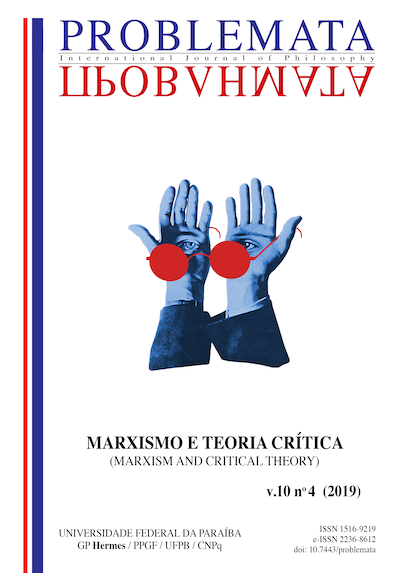THE SOCIO-ONTOLOGICAL ASSUMPTIONS OF CRITICAL THEORY:
A SELF-REFLECTION EXERCISE
DOI:
https://doi.org/10.7443/problemata.v10i4.49655Keywords:
Critical theory, Social ontology, Self-reflexivity, Immanent critiqueAbstract
In this paper, we seek to defend the idea that the field of social ontology can and should interest the field of critical theory. For this, we emphasize that a social theory that is supposed to be self-reflexive cannot ignore the reflection on its own socio-ontological presuppositions. Thus, in a first moment, we will attempt to show how critical theory must presuppose a processual social ontology, insofar as it needs to regard social change as ontologically consistent. In a second moment, we will show that critical theory also needs to deal with substantialist ontological assumptions to understand the obstacles to emancipation. Finally, we will highlight the challenges to the compatibility of this dual perspective.
Downloads
Download data is not yet available.
References
ADORNO, T. W. Dialética negativa. Rio de Janeiro: Jorge Zahar, 2009.
______. Crítica cultural e sociedade. In: ______. Prismas: crítica cultural e sociedade. São Paulo: Ática, 1998.
ADORNO, T. W.; HORKHEIMER, M. Dialektik der Aufklärung: philosophische Fragmente. Frankfurt: Suhrkamp, 1997.
BALIBAR, E. La philosophie de Marx. Nouv. éd. Paris: La Découverte, 2001.
BOURDIEU, P. Esquisse d’une theorie de la pratique. Paris: Seuil, 2000.
COHEN, J. Class and civil society: the limits of Marxian critical theory. Cambridge: MIT Press, 1982.
DARDOT, P.; LAVAL, C. Marx, prénom: Karl. Paris: Gallimard, 2012.
DURKHEIM, E. Les règles de la méthode sociologique. 14e éd. Paris: PUF, 2013.
GOFFMAN, E. Frame analysis: an essay of the organization of experience. Cambridge: Harvard University Press, 1974.
FISCHBACH, F. Philosophies de Marx. Paris: Vrin, 2015.
HABERMAS, J. Theorie des kommunikativen Handelns: Bd 2 – Zur Kritik der funktionalistischen Vernunft. Frankfurt am Main: Suhrkamp, 1981.
______. Technik und Wissenschaft als “Ideologie”. Frankfurt: Suhrkamp, 1969.
HEGEL, G. W. F. Gesammelte Werke. Bd. 11. Hamburg: Felix Meiner, 1968.
HORKHEIMER, M. Traditionelle und kritische Theorie. In: ______. Gesammelte Schriften. Bd 4. Frankfurt am Main: Fischer, 2009.
______. A presente situação da filosofia social e as tarefas de um Instituto de Pesquisas Sociais. Revista Praga, n. 7. São Paulo: Hucitec, 1999.
JAEGGI, R. Entfremdung. Frankfurt am Main: Campus Verlag, 2005.
JOAS, H. Die Kreativität des Handelns. Frankfurt am Main: Suhrkamp, 1996.
LÉVI-STRAUSS, C. Anthropologie structurale. Paris: Pocket, 2003.
MARX, K. O capital: crítica da economia política. Livro 1, tomo 1. Trad. Regis Barbosa e Flávio R. Kothe. São Paulo: Abril Cultural, 1996. (Os Economistas).
______. O capital. Livro 3, tomo 2. São Paulo: Nova cultural, 1986. (Os Economistas).
NOBRE, M. A teoria crítica. Rio de Janeiro: Jorge Zahar, 2004. (Filosofia Passo-a-Passo).
RENAULT, E. Critical theory and processual social ontology. Journal of Social Ontology. Vol. 2, n. 1, p. 17-32, 2016.
SEARLE J. The construction of social reality. New York: Free Press, 1997.
STAHL, T. Immanente Kritik: Elemente einer Theorie sozialer Praktiken. Frankfurt: Campus Verlag, 2013.
______. Habermas and the project of immanent critique. Constellations, Vol. 20, n. 4, p. 533-552, 2013.
______. Crítica cultural e sociedade. In: ______. Prismas: crítica cultural e sociedade. São Paulo: Ática, 1998.
ADORNO, T. W.; HORKHEIMER, M. Dialektik der Aufklärung: philosophische Fragmente. Frankfurt: Suhrkamp, 1997.
BALIBAR, E. La philosophie de Marx. Nouv. éd. Paris: La Découverte, 2001.
BOURDIEU, P. Esquisse d’une theorie de la pratique. Paris: Seuil, 2000.
COHEN, J. Class and civil society: the limits of Marxian critical theory. Cambridge: MIT Press, 1982.
DARDOT, P.; LAVAL, C. Marx, prénom: Karl. Paris: Gallimard, 2012.
DURKHEIM, E. Les règles de la méthode sociologique. 14e éd. Paris: PUF, 2013.
GOFFMAN, E. Frame analysis: an essay of the organization of experience. Cambridge: Harvard University Press, 1974.
FISCHBACH, F. Philosophies de Marx. Paris: Vrin, 2015.
HABERMAS, J. Theorie des kommunikativen Handelns: Bd 2 – Zur Kritik der funktionalistischen Vernunft. Frankfurt am Main: Suhrkamp, 1981.
______. Technik und Wissenschaft als “Ideologie”. Frankfurt: Suhrkamp, 1969.
HEGEL, G. W. F. Gesammelte Werke. Bd. 11. Hamburg: Felix Meiner, 1968.
HORKHEIMER, M. Traditionelle und kritische Theorie. In: ______. Gesammelte Schriften. Bd 4. Frankfurt am Main: Fischer, 2009.
______. A presente situação da filosofia social e as tarefas de um Instituto de Pesquisas Sociais. Revista Praga, n. 7. São Paulo: Hucitec, 1999.
JAEGGI, R. Entfremdung. Frankfurt am Main: Campus Verlag, 2005.
JOAS, H. Die Kreativität des Handelns. Frankfurt am Main: Suhrkamp, 1996.
LÉVI-STRAUSS, C. Anthropologie structurale. Paris: Pocket, 2003.
MARX, K. O capital: crítica da economia política. Livro 1, tomo 1. Trad. Regis Barbosa e Flávio R. Kothe. São Paulo: Abril Cultural, 1996. (Os Economistas).
______. O capital. Livro 3, tomo 2. São Paulo: Nova cultural, 1986. (Os Economistas).
NOBRE, M. A teoria crítica. Rio de Janeiro: Jorge Zahar, 2004. (Filosofia Passo-a-Passo).
RENAULT, E. Critical theory and processual social ontology. Journal of Social Ontology. Vol. 2, n. 1, p. 17-32, 2016.
SEARLE J. The construction of social reality. New York: Free Press, 1997.
STAHL, T. Immanente Kritik: Elemente einer Theorie sozialer Praktiken. Frankfurt: Campus Verlag, 2013.
______. Habermas and the project of immanent critique. Constellations, Vol. 20, n. 4, p. 533-552, 2013.
Downloads
Published
2019-12-16
Issue
Section
COLABORADORES NACIONAIS
License
Authors who publish with this journal agree to the following terms:
- Authors retain copyright and grant the journal right of first publication with the work simultaneously licensed under a Creative Commons Attribution License that allows others to share the work with an acknowledgement of the work's authorship and initial publication in this journal.
- Authors are able to enter into separate, additional contractual arrangements for the non-exclusive distribution of the journal's published version of the work (e.g., post it to an institutional repository or publish it in a book), with an acknowledgement of its initial publication in this journal.
-
- Authors are permitted and encouraged to post their work online (e.g., in institutional repositories or on their website) prior to and during the submission process, as it can lead to productive exchanges, as well as earlier and greater citation of published work (See The Effect of Open Access).





